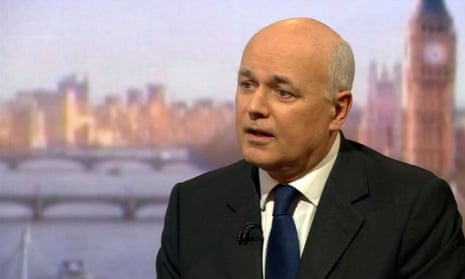Iain Duncan Smith has declined to rule out imposing a four-year ban on young people in Britain claiming in-work benefits as a way of securing a deal in David Cameron’s EU negotiations.
Amid strong opposition across the EU to the prime minister’s plans to impose such a ban on EU migrants, the work and pensions secretary raised the possibility that the change could be achieved by imposing it on UK citizens as well.
The prime minister, who had hoped to conclude his EU negotiations at a summit later this month, was forced to agree last week that he would have to wait until the new year to finalise the deal.
Cameron agreed to the delay after the German chancellor, Angela Merkel, told him in a telephone call that there was strong opposition to his plan to seek to limit migration to the UK by imposing a four-year ban on EU migrants claiming in-work benefits.
Downing Street has been told that it would be discriminatory to seek to limit access to in-work benefits to EU citizens from the bloc’s 27 other countries but allow unlimited access to UK citizens.
In an interview on BBC1’s Andrew Marr Show on Sunday, Duncan Smith said that imposing a blanket ban on all EU citizens – UK and non-UK – was not formally part of the negotiations.
“This has never been part of our proposal. We will wait and see what is decided,” he said. Asked whether he would be against the idea of imposing the ban on UK citizens, Duncan Smith declined to be drawn. He said: “I am in the business with the prime minister of delivering what the prime minister said he wanted at the time of the election through the manifesto. What he has said clearly to his European colleagues is we need to do this.”
The Guardian reported last month that Britain could seek to avoid charges of discrimination against UK citizens by introducing a residency test. Under proposals drawn up by Max Chambers, one of the prime minister’s special advisers, no EU citizen could claim in-work benefits until they have lived in the UK for four years and no UK citizen could claim in-work benefits until four years into adulthood.
The residency test is seen in Whitehall as more benign to UK citizens than an alternative proposal to avoid charges of discrimination. This would involve restricting access to in-work benefits until UK and EU citizens have worked for four years. This “contributory principle” is supported by leading Eurosceptic cabinet ministers such as Duncan Smith.
In his Marr Show interview, the work and pensions secretary said that the delay in the EU negotiations should be seen as a sign of strength for the prime minister. Duncan Smith said: “The delay, which everyone has said is a sign of weakness, is a sign of strength. It says the prime minister is determined not just to come back with any deal but to come back with a deal that he knows he can sell to the British people. That speaks volumes about his determination.”
But Duncan Smith, who is a member of the cabinet sub-committee overseeing the EU negotiations, declined to rule out opposing the deal secured by the prime minister. If Cameron declines to suspend collective cabinet responsibility in the run-up to the EU referendum, Duncan Smith would have to resign.
The work and pensions secretary said: “At the moment, when the deal is on the table that is when you assess whether you think it is in the benefit of Britain to stay in the EU or leave. I have always said: look, my judgment is that at that moment my position will become very, very clear. But it is hugely dependent on what we get back.”
Duncan Smith’s intervention came as the main out campaign, Vote Leave, expressed fears that the prime minister would seek to lead the campaign to leave if he fails in his negotiations. Vote Leave, which believes Cameron would weaken its campaign, would rather Boris Johnson was its main figurehead.
